![A Peek Behind the Curtain]()
by Steve | May 22, 2017 | Magazine, Magazine Articles, May-June 2017
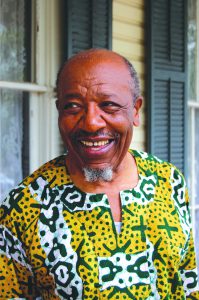
Civil rights leader John M. Perkins, founder and President Emeritus of the John and Vera Mae Perkins Foundation-Jackson, MS. Photo courtesy of Voice of Calvary.
By Courtney Lott-
“I looked, and behold, a great multitude which no one could count, from every nation and all tribes and peoples and tongues, standing before the throne and before the Lamb, clothed in white robes, and palm branches were in their hands; and they cry out with a loud voice, saying, ‘Salvation to our God who sits on the throne, and to the Lamb.’” (Revelation 7:9-10 NASB)
In John’s vision of the kingdom of God we are presented with a very diverse picture of its citizens. The worshippers come from every race, every language, every nation. Far from monochromatic, the kingdom of Heaven is an undoing of Babel, a breaking of barriers, the unification of Christ’s body. But when we look at our churches today, at our congregations, what do we see? Though in many ways the church has taken great strides against racism, the after effects of old structures and mindsets remain like fingerprints on a mirror. As Christians, we are called to take a sober look at these things. Racial reconciliation is hard, but thankfully, many have undertaken to aid the church in this difficult journey. The following books are helpful perspectives for this conversation. Each voice is different and offers its own unique angle.
Holding Up Your Corner
For situations fraught with sensitivity, practical guidance is essential. In Holding up Your Corner, the Rev. F. Willis Johnson, a United Methodist pastor, provides wisdom and insight. Offering helpful definitions and sober advice that is practical rather than preachy, this book equips leaders and readers to approach racial reconciliation with grace. Through his accounts of the racial strife in Ferguson, Missouri, and similar events, Johnson gives his audience the unique experience of seeing the world through his eyes.
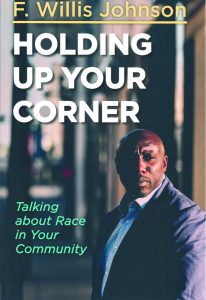
“Once we have acknowledged someone’s humanity, we can move on to affirmation – respecting their humanity,” Johnson writes. “Hear this: affirmation is neither an act of complicity nor condemnation. Affirming someone’s experience – their humanity in their own experience – does not mean you approve their ideology or behavior. We can love people without agreeing with them. That bears repeating: we can love people without agreeing with them. In the words of Howard Thurman, ‘Hatred does not empower, it decays. Only through self-love and love for one another can God’s justice prevail.’ In short, affirmation is a willingness to emphasize our interdependence and commonality over our difference.”
Holding up Your Corner is carefully rooted in the scriptural idea of balancing both justice and mercy, truth and grace, the practical and prophetic. It reaches out with gentleness and humility that challenges the reader in such a way as to promote conversation rather than dampen it. Johnson’s humble way of engaging his audience invites engagement rather than shutting it down. This book is a desperately needed guide through the difficult terrain that the church now faces in regard to loving the “other.”
Unashamed
Unashamed, the autobiography of mega-star Christian rapper, Lecrae, holds as its central concept the need for acceptance. From the first page, the writing conveys the painful sting of rejection. The reader can’t help but wince through the author’s childhood abandonment issues and heartache, then rejoice at the acceptance found in Christ. Yet Lecrae offers a starkly honest picture of his conversion and doesn’t shy from sharing his struggles with sanctification.
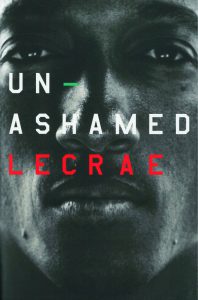 As a poetic artist, Lecrae makes a distinction between a “Pastor Rapper” and that of a “lamenter” – a passionate expression of grief or sorrow that is an outgrowth of his youth and the abandonment he felt. When he was free from trying to preach like a “Pastor Rapper,” Lecrae felt the words and rhythms flow when he allowed himself to be vulnerable and honest about his own battles.
As a poetic artist, Lecrae makes a distinction between a “Pastor Rapper” and that of a “lamenter” – a passionate expression of grief or sorrow that is an outgrowth of his youth and the abandonment he felt. When he was free from trying to preach like a “Pastor Rapper,” Lecrae felt the words and rhythms flow when he allowed himself to be vulnerable and honest about his own battles.
Lecrae describes his unique position within the industry and how it provides him with the opportunity to reach people others might not be able to. He writes: “Operating as a ‘Pastor Rapper’ was hard work for me because it wasn’t playing to my strengths. Rather than letting the music pour out of me when the inspiration came, I would spend hours studying beforehand … Being theologically educated is a great thing. And using music to explicitly express theology is needed. But I mistakenly believed it was the only way to make music. On the rare occasion, however, I would let go and let the ‘lamenter’ in me come out. When I did – when I let Lecrae just be Lecrae – it would spark magic… Rather than make myself the winner, I allowed myself to be the loser… People wrote to say how much that song impacted them because it was real and vulnerable. And this was one of the first moments I began to wonder if maybe God was calling me to make a shift in my music and begin producing new songs that were truer to how I was naturally made.”
Who Lynched Willie Earle?
Centered around a specific event, Who Lynched Willie Earle approaches the issue of race from a historical standpoint. Bishop Will Willimon creatively reimagines Pastor Hawley Lynn’s thought process leading up to his sermon condemning the lynching of a black man accused, but not convicted, of murder. Pastor Lynn confronted his own congregation with the mindset he believed led to the lynching, the deeply ingrained attitudes that allowed the mob to pervert “democratic justice” and execute Willie Earle.

Willimon, prolific author and retired United Methodist bishop, proceeds to analyze the sermon. Not only does he take into consideration the history of America, but also connects this with Israel, the Gentiles, and the kingdom of God. Willimon also points out Pastor Hawley’s own blind spots, in which he failed to address systemic, institutional racism. In this, Willimon says, the church was able to “disassociate themselves from the sin and to bolster their confidence in Jim Crow.” In spite of his failings, Willimon calls Pastor Hawley’s sermon “heroic homiletics”.
“Though these sociological and historical facts about racism are significant, race is a specifically Christian problem because of the God we are attempting to worship and to obey,” Willimon writes. “In the gospel, we are given the means to be color-courageous, to talk about matters our culture would rather keep silent. That you have persevered this far in this book suggests you are exercising a bravery that is not self-derived. Paul says that, in God’s realm, Jews and Greeks, slave and free, ‘You all are one in Jesus Christ’ (Galatians 3:28). It is a baptismal call, not for color-blindness or arguing that gender or race are inconsequential, but rather a theological affirmation that Jesus Christ enables a new eschatological community where conventional, worldly signifiers don’t mean what they meant in the kingdoms of this world.”
Dream with Me: Race, Love, and the Struggle We Must Win
Like Unashamed, Dr. John Perkins’ approach is extremely personal and humble. In spite of this, he does not shy away from calling out injustice and racism. Quoting Frederick Douglas and sighting the stark reality of his own experience with segregation, Perkins focuses on the “walls that have kept black people and white people apart, even in places where we had so much in common.”
 “Anyone who knows my story would expect this book to ooze with justice issues. After all, the pain caused by injustice has motivated me to spend a lifetime working for social change on behalf of widows, prisoners, the poor, and anyone who struggles,” writes Perkins, the civil rights veteran who has led the Voice of Calvary Ministries in Jackson, Mississippi, since 1975. “So how did someone who has experienced the anguish of poverty, racism, and oppression end up wanting to write a book about love as his climactic message? Good question… I’ve come to understand that true justice is wrapped up in love. God loves justice and wants His people to seek justice (Psalms 11 and Micah 6:8). But I’ve come to understand that true justice is wrapped up in love. The old-time preacher and prophet A.W. Tozer had a way of making the most profound truths simple and palatable. He once said, ‘God is love, and just as God is love, God is justice.’ That’s it! God’s love and justice come together in the redemptive work of Jesus Christ, and we can’t be about one and not the other. They’re inextricably connected.”
“Anyone who knows my story would expect this book to ooze with justice issues. After all, the pain caused by injustice has motivated me to spend a lifetime working for social change on behalf of widows, prisoners, the poor, and anyone who struggles,” writes Perkins, the civil rights veteran who has led the Voice of Calvary Ministries in Jackson, Mississippi, since 1975. “So how did someone who has experienced the anguish of poverty, racism, and oppression end up wanting to write a book about love as his climactic message? Good question… I’ve come to understand that true justice is wrapped up in love. God loves justice and wants His people to seek justice (Psalms 11 and Micah 6:8). But I’ve come to understand that true justice is wrapped up in love. The old-time preacher and prophet A.W. Tozer had a way of making the most profound truths simple and palatable. He once said, ‘God is love, and just as God is love, God is justice.’ That’s it! God’s love and justice come together in the redemptive work of Jesus Christ, and we can’t be about one and not the other. They’re inextricably connected.”
Perkins takes a strong look at motivation. By keeping in mind questions about his own choices, he tempers his assessment with a great deal of grace and mercy. Perkins challenges parents to be mindful of the way that education choices may have a positive or negative effect on black children in public schools. Additionally, he asserts that integrating our churches is at the very heart of the gospel, the very heart of 2 Corinthians 5:19.
If we want to work toward racial reconciliation in a country that desperately needs it, if we desire to share the love of Christ with all nations, we must take steps to build empathy for our brothers and sisters. The books on this list are testimonies, a mere peek behind the curtain, but they may also serve as first steps. Ultimately, God alone through Jesus Christ can accomplish this. Racism, comparison, pride, arrogance, greed all root deep down in the hearts of man. But thanks be to God that he does not leave us in this sad state!
Courtney Lott is the editorial assistant at Good News.

by Steve | May 22, 2017 | Magazine, Magazine Articles, May-June 2017

Photo courtesy of Compassion International.
By Shannon Vowell-
Did you know that Methodism has been in India for a long time? I didn’t. For me – for many – the Methodist Church and the country of India intersect only in the work of the illustrious E. Stanley Jones, 20th century Methodist missionary giant and friend of Gandhi. But Jones’s seminal work, Christ of the Indian Road, was written 69 years after the first emissaries from the Methodist Episcopal Church in America arrived in the then-state of Oudh.
Not only has Methodism been in India 161 years, Methodism maintains a prominent place in the Indian pantheon of faiths. The autonomous Methodist Church of India has 12 regional conferences under 6 Episcopal areas. Total membership for the MCI and the Churches of North and South India (members of the World Methodist Council) approaches 5,648,000. (To put that in perspective, total membership for the UMC in the U.S. in 2015 was 7,067,162.)
This historic and ongoing connection is one of several compelling reasons why United Methodists should take note of recent events in India. What has happened to Christian ministries there matters to us, because we share with them the purpose of “making disciples of Jesus Christ for the transformation of the world.” Further, what happens next may depend on us, because ever-fewer disciple-makers remain in place.

Photo courtesy of Compassion International.
On March 15, 2017, Compassion International – the Christian global ministry giant specializing in serving vulnerable children– ended 50 years of Indian ministry. Nearly 150,000 children who had had access to food, clean water, medical care, education, and the encouragement of foreign sponsors and local community centers, lost access to all of the above in the space of a day.
Why? Well, we’ll start with the politically correct, official, version of what happened.
American politicians bemoaned a mysterious inability on the part of Compassion and the Indian government to identify and agree on a mutually acceptable compromise regarding regulation and tariff laws. Legal representatives for Compassion pointed to egregious misapplication of Indian laws on the part of the Indian government.
In reality, Compassion is the largest of hundreds of charitable (mostly Christian) non-government organizations (NGOs) being systematically ousted from India, because the prevailing worldview of the most recently elected regime there has influenced the way the law is applied. The issue is not whether Compassion violated or failed to compromise on some obscure regulatory code embedded in Indian tax law. Nor is it that the Indian government misinterpreted its own laws for financial gain. Rather, the issue is that a Hindu Nationalist regime cannot be true to its own principles while accommodating foreign operatives who have overtly Christian motives.
Stating these truths – politically incorrect as they are – has to be our first step in identifying what challenges may lie ahead for Methodist brothers and sisters who remain in place in India.
Next steps include cultivating a basic understanding of the ways Hinduism and Christianity are mutually exclusive. For example, the caste system. Officially extinct but actually in full force and effect, especially in rural areas among the poorest poor, this system categorizes Indian citizens into spiritual social tiers, between which there is no movement. The tiers and one’s place in them, are fixed and connected to the Hindu doctrine of karma. Karma explains a person’s life station and suffering as part of the cycle of existence; repeated reincarnations allow a human soul to make reparations for past sins in past lives. Progress can occur with each rebirth of the soul, as good works accrue and past sins are expiated. This progress leads the soul toward transcendence – moksha.
For a Hindu, serving the poor and marginalized can be personally expedient, because good deeds build good karma for oneself; this in turn accelerates progress toward moksha. But at the same time, one must not interfere with the karma of those being served. Within Hinduism, to artificially elevate someone to a different life station is to condemn them to further incarnations in which penance is required – delaying moksha and actually prolonging suffering. Politically incorrect to acknowledge, but nevertheless true: Karma provides justification for non-interference in the cycle of suffering – and karma labels indifference to the desperately poor a moral good.
By contrast, the Christian doctrine of reconciliation to God and equality in the eyes of God requires Christians to embrace and serve the poor as family, literally! Jesus gathered in the marginalized and comforted the forsaken, so Christians must do likewise. Historically, Methodists have applied this doctrine of reconciliation by founding and funding institutions whose very purpose is the interruption (and abnegation!) of the cycle of suffering: orphanages, schools, soup kitchens, hospitals, ministries of healing and help.
We United Methodists share the Indian dilemma faced by Compassion and ministries like it. Looking at a country where an estimated majority of the world’s poorest poor live, our Christian work appears urgently relevant and necessary. But the government which can give or withhold access to its needy population literally sees things differently.

Photo courtesy of Compassion International.
Hinduism protects the status quo as just and right within karma, and understands the alleviation of suffering as more harmful than the suffering itself. Christians challenge the status quo as part of the call to transform the world in Jesus’s name. Such deep contradictions in basic understandings of human worth, life purpose, and duty to fellow man must be acknowledged, no matter how politically incorrect such acknowledgement feels. To do otherwise – to “explain away” the situation in India as some petty money matter – makes a mockery of both Hindu and Christian belief systems.
The world of diplomacy often treats belief systems as side issues. But the inconvenient fact is that governments legislate based on systems of belief. These belief systems are not interchangeable. Indeed, they are often mutually exclusive.
Rather than capitulate to the stalemate of the world’s status quo, Christians must stand firm on the faith that puts the world in its proper perspective. We serve a God who is neither constrained nor confused by the idiocies of political correctness!
John Wesley’s example of persistent, faithfully offensive shrugging off of the world’s expectations of him surely makes Methodists uniquely qualified to handle situations like the one in India. And E. Stanley Jones’s testimony to the cross-cultural power of Wesleyan witness within the specific context of India surely applies all the more urgently today. Perhaps it is within the unique, Methodist application of the gospel that we may find the way forward for ministry in India (or anywhere the gospel is officially rejected)?
As Wesley taught us, we are to be people of One Book and servants of One Master. Because the children of India are children, and because they are suffering, and because we are Christians, we must be moved to compassion. “Little children, let us love, not in word or speech, but in truth and action” (1 John 3:18).
Following the example of Christ, who admonished his disciples when they prevented the children from drawing near to Him, we must find ways to serve the poor children of India. We must look beyond the shrugged shoulders of worldly governments and rely on the One on whom rests all the authority of the cosmos. “… our citizenship is in heaven, and it is from there that we are expecting a Savior, the Lord Jesus Christ” (Philippians 3:20).
For our part, United Methodists should pray that Christian and other non-profit humanitarian organizations would be permitted to resume their work in India. We should also pray that a new generation of Hindi-speaking Christians be granted wisdom in order to reach India with the love of Jesus. Lastly, we should pray that the hearts and minds of the government officials working with Prime Minister Narendra Modi would be softened and changed.
Perhaps the words of Jesus himself define the terms of our obligation most clearly: “Take care that you do not despise one of these little ones; for, I tell you, in heaven their angels continually see the face of my Father in heaven” (Matthew 18:10).
Politically incorrect and discomfiting as it may be, United Methodists cannot allow governments to dictate which children may be loved. Compassion, the organization, has been jettisoned from India for one reason: because they served the poor in Jesus’s name. Compassion, the core characteristic of Jesus, cannot be redefined in order to justify or explain away that historical fact.
Shannon Vowell writes and teaches on loving Christ and making disciples.

by Steve | May 22, 2017 | Magazine, Magazine Articles, May-June 2017

Ruth Burgner
By Ruth Burgner-
Those of us in the missionary community get to hear stories of extraordinary fruitfulness. For example, a TMS Global missionary family serving for the past 16 years in Peru recently reported that more than 8,200 people in 13 states in Peru are being discipled. This all started in 2006 with only three small groups meeting in this family’s house.
But as you know, in ministry there are other smaller, quieter happenings. These might go untold because they might seem to us too unremarkable or too unfinished to seem worthy to mention. They might be the planting parts, not the harvesting parts. They might be the details of the times when nothing, or only the most miniscule thing, appears to be happening. I sometimes wonder if missionaries – and all of us – hesitate to tell those bits. After all, says author and spiritual director Mark Yaconelli (Nomad, podcast 114), most people don’t tell our story until there is a happy ending. Is it okay to testify about the middle parts, even before we know how it all turns out, even before everything seems resolved?
Recently, I heard the telling of a “middle part.” One of our missionaries, Sue Fuller, who has served for the last 22 years among orphans in the Russian Far East, recalled events of a particular week. She and her-then roommate, Ari (who now serves on the home office staff), had enjoyed a day with the girls of the orphanage. They decided they would also plan a fun event for the boys. Planning for boys, though, seemed less intuitive. So they did what they knew to do. They planned food (always a winner) and karaoke (which is apparently big in Russia). The event all went well enough, although pretty low-frills in their eyes. They just hoped the orphan boys felt loved and had a good time.
But then days later, Sue overheard one of the boys talking about it to a friend. He told details about every single thing he ate and every song they played. And then this young orphan boy told his friend, “It was the best day of my whole life.”
From this account, we don’t know what happens next in the life of this young orphan, for whom one karaoke-and-snacks event was his all-time highlight. Even so, the graces in this story stand out like the colors of a sunrise. I love that Sue took note of them.
Pay attention to the graces; hunt for them, our TMS President Max Wilkins told the audience of a recent event. “Heaven and earth are full of the glory of God. …We train our missionaries to go as ‘glory sighters.’” And our missionaries are some of the best “glory sighters” I know. Eagerly, they spy out the signs of God’s activity, even in the seemingly bleakest settings.
For example, Kathleen,* a TMS Global missionary and nurse, was working in a hospital in one of the most difficult areas in Southeast Asia. When she was asked why she stayed, here is how she answered: “Why do I stay in this sweltering, filthy, difficult place? It’s not as hard a question to answer as some might think. Jesus is here in this place. I see Him all around me. I see Him in the gentle touch of the nursery staff as they attempt to care for too-small, too-weak infants who are often lying three to a crib. I see Him in the sorrow on a father’s face as he sits at the bedside of his child slowly squeezing an ambu bag because there are no more ventilators available. I feel Him with every new experience, every new story, one more baby who won’t die in a sack in a drainage ditch, one more daughter-in-law who won’t be beaten to death, one more child who won’t be sold into slavery, one more family laughing, dancing, and rejoicing in their new-found hope in a Savior called Jesus. This is a place surrounded by hardship, discouragement, struggle, and frustration. This is the Garden of Gethsemane. Jesus is sweating great drops of blood here, and I want to be with Him.”
You and I might not often see like Kathleen and Sue. It’s easy to view the world through lenses of dull gray. After all, notes Eugene Peterson, “We do not live in a world that promotes or encourages wonder.” And yet into this world the kingdom of God has come. The crucified Christ is risen. The whole earth is full of His glory. Like these missionaries, we can learn to see with new eyes. We can develop a disposition of awe. We can learn to “rejoice in the Lord always” (Philippians 4:4). “We have to cultivate responses of awed reverence,” says Peterson, “or risk missing the very heart of what is going on.”
Ruth A. Burgner is the senior director of communications for TMS Global – www.tmsglobal.org. *A pseudonym.

by Steve | May 22, 2017 | Magazine Articles, May-June 2017
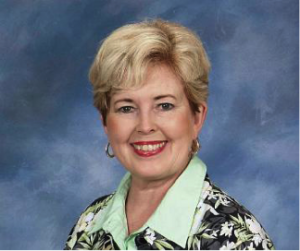 By B.J. Funk-
By B.J. Funk-
The ways of the world have an alluring effect, even to those who are dedicated to Christ. As our church sang jubilantly, “On Christ the solid rock I stand, all other ground is sinking sand,” my thoughts moved to the times I have foolishly chosen the sinking sand instead of the solid Rock. Sometimes, I place my toe in the quicksand, trusting that I can move away quickly. However, to my surprise my entire foot begins to sink, seeking to pull all of me down. It’s like I think, “Just a toe. It’s only a toe. Surely I can rescue a toe.” The quicksand creates a formidable pull, and one toe in allures my entire foot and soon my leg. If I don’t make a conscious decision to try to get out, I will continue sinking, though it is likely already too late.
Quicksand is defined as “loose wet sand that yields easily to pressure and sucks in anything resting on or falling into it.” In our day to day lives, one moment of a thoughtless, ill-chosen decision can create that loose sand that easily sucks in anything in its path. You might find yourself in financial quicksand, marital quicksand, or relationship quicksand. Then, if one is in the habit of ranking sins, he might wrongly think there is a decision of lesser consequence: a quicksand of thoughts, a quicksand of holding a grudge, a quicksand of a negative attitude or a quicksand created by our thoughtless words toward someone else.
However, I don’t think that God ranks sin. A sin is a sin. Some carry consequences of larger proportion, affecting not only ourselves but our family and friends. Other sin is hidden, known only to that person and God. Still, to deny there are consequences to all sin is to keep our minds locked into what we prefer to notice. In truth, we prefer to think that quicksand does not even exist. This illusion is perhaps the most dangerous type of sinking sand.
Humans are amazingly good at this. Take our first mother, Eve. She thought the quicksand didn’t exist. As she plucked the fruit from the forbidden tree, she stuck her toe into the sand that would engulf her whole self, thinking, “Just a toe. Only a toe. Surely I can rescue a toe.” When Eve danced over to tell Adam that she has chosen an alternative view from God’s advice, she sparkled with this new discovery. Now, she would know as much as God. She offered the same delusion to Adam. And he ate. Only one piece of fruit. Only one toe. Together they put their whole selves into the quicksand. Whereas they had been created for a relationship with their Maker, for holiness and happiness, their descent into the thick sand brought about the loss of their innocence, the loss of light and the beginning of dark. Paradise sank into the sand as death entered.
God changed their address from Rich Intimacy to Pain and Brokenness. That address would become the address of all humanity. We became helpless on our own to get out of the sinking sand.
The Bible is filled with examples of toe dipping leading to sinking sand, of leaders who thought, “It’s just one toe. Only one toe. Surely I can rescue a toe.” Moses killed one man. Jacob schemed with one bowl of soup. David planned one murder. Peter hid behind one lie. None of them were successful in pulling out their toe. Their dip into sin had far-reaching consequences.
The greatest story teller of all gives us a vivid example of exactly what can happen when we stand on “all other ground is sinking sand.” Jesus’ parable in Matthew 7: 24-27 puts these thoughts into perspective. Those who hear the words of Jesus and act on them, he explained, are like a wise man who builds his house on a rock. When the rains fall and the floods come along with heavy winds pounding the house, it does not fall because the house is built on a rock. In contrast, the foolish man builds his house on sand, and the pounding wind and rain easily push over the house.
Only Jesus can break the power of sin in our lives. Because of Jesus, you and I have the unbelievable privilege of leaving the sin of sinking sand and choosing instead, the solid Rock of Rich Intimacy.
Watch where you put your toe.

by Steve | Mar 20, 2017 | Magazine, Magazine Articles, March-April 2017

Rev. Rob Renfroe
By Rob Renfroe-
Facing reality can be painful. Especially when the only choices reality offers us are difficult, unsatisfying, or confusing. At that point there is a tendency to walk away from the problem emotionally and mentally in one of two ways. There’s the Scarlett O’Hara approach: “I can’t think about that right now. If I do, I’ll go crazy. I’ll think about that tomorrow.” Or we tell ourselves everything is going to be ok and make up some reason why we don’t have to act. In other words, we create a comforting myth that helps us sleep at night but that actually does nothing to resolve the issue. Either way, we deny reality and usually end up with a solution far worse than what might have been.
I’m afraid many United Methodists are still denying the reality of how deep our divisions run and how difficult a workable solution to our problems will be. I believe this because of the myths I hear people, many well-intended, clinging to and trying to persuade others to believe.
One long-standing progressive myth, recently restated by a retired bishop, is so obviously false that it’s hard to imagine anyone still holding on to it. It’s the idea that our differences over sexuality can be resolved through “the local option” – that is, allowing individual pastors to determine whether to marry same-gendered couples and permitting each Annual Conference to decide whether to ordain practicing gay persons.
Only persons who have been asleep longer than Rip Van Winkle was could find any solace in this illusion. More benign compromises failed to gain General Conference approval in the past decade. And more recently in Portland last May, after several of our leading pastors and our most influential administrative body, the Connectional Table, used all of their influence to promote such a plan, it was so soundly defeated in committee that it was not even brought to the plenary floor. The local option is dead. I pray that the Bishops’ Commission on A Way Forward will not waste precious time following our own Alices in Wonderland down that rabbit hole.
A conservative myth that needs to be dispelled is “maybe the progressives will leave.” It usually begins with the statement, “If they don’t like the way the church is, they should leave and start their own.” Sorry to burst your bubble, but this is a political battle. And in politics “should” has nothing to do with what people actually do. The progressive goal is to change the whole church, not create a progressive subdivision of the church.
An amicable separation (or as some have begun to call it “a new form of unity”) may be proposed by the Bishops’ Commission, but the progressives are not going to just up and leave on their own. Why would they? They just elected as bishop a married lesbian who has stated that she has performed 50 gay weddings. In the entirety of the Western Jurisdiction, in most of the Northeastern Jurisdiction, and in much of the North Central Jurisdiction pastors may marry gay couples and break the Book of Discipline with no consequences of any kind. A dozen annual conferences are on record that they will ordain practicing gay persons regardless of church law. So, why would progressives leave when they can do what they want to do, have continued access to general church funds, and can keep the name United Methodist?
“Well, we’ll write stricter legislation at General Conference and make it even harder for them to break the rules.” We have good policies now. Our problem has never been bad legislation; it has always been bad actors. You can be sure they will be just as disobedient to stricter rules as they are to the present ones.
“Then, let’s go nuclear. Let’s make the rules so that we can vote out any pastor, bishop, or congregation that breaks church law.” I understand this approach, but I find it less than realistic. Conservatives hold the line against gay marriage and ordination by the slimmest of margins every four years. It is a misguided myth to believe that the General Conference is going to give some governing body the authority to start excommunicating pastors, churches, and bishops. That’s not who United Methodists are. We are nice people, warm-hearted and generous of spirit. General Conference will never pass a proposal for some small group to be authorized to decide who’s a good enough Methodist to stay in the church and who’s not.
“But maybe in 20 years, we can ‘win.’” Faithful United Methodists are leaving our congregations every day because of the continuing battle over sexuality. People are tired of it and they’re walking away. Two large churches in Mississippi – one the 15th largest church in the denomination – have announced they are leaving. That’s in conservative Mississippi where no one is marrying gay couples and where the bishop upholds the Book of Discipline. In the Good News office, we regularly receive calls from pastors who are under pressure by their congregations, especially in liberal areas, to lead them out of the denomination.
If the Bishops’ Commission does not resolve this issue, there will be no “twenty years from now.” People will leave. Pastors will leave. Churches will leave. Conservative people, pastors, and churches. If the Commission does not come up with a solution, the church will be in so much chaos that the slow drip, drip, drip of faithful evangelical members leaving will become a roaring flood.
As evangelicals and traditionalists, we need to do some serious thinking about what it means to “win.” Win what? A church that 20 years from now could be so depleted in numbers that “a faithful remnant” would be a generous euphemism to describe what’s left? Winning is not holding onto a church that is a shadow of what it once was and what it could have been. A win for the Kingdom is coming out of the present mess with as many faithful Methodists as possible connected to each other and working together for the Kingdom.
One final myth is that “what’s at stake is the unity of the church.” We’re way past that. One bishop recently stated to his pastors, “Twelve of our annual conferences are in schism right now. They are unwilling to live by our covenant and that places them in schism.” Twelve annual conferences. That’s over one-fifth of the conferences in the United States and there are others who do not live by the Discipline, they just haven’t stated so publicly.
We are not a united church. Having the same name on our signs and the same logo on our letterhead does not make us a unified church. The bishops had their opportunity to work for the unity of the church by teaching our doctrines and enforcing our covenant for the past 50 years. Instead, many decided to be permissive parents allowing disobedience and rebellion, and others actually promoted such behavior. And sadly, few of our conservative bishops have banded together to speak out or call the rogue bishops to task. And the result, as it is with all families headed by permissive parents, is not unity but dysfunction, self-centeredness, and division.
Over a decade ago I told a group of bishops, tasked with creating unity within the church, “You may wish you had another issue to deal with other than sexuality. But this is the issue of your time that threatens to divide the church. You will either act in a way that holds us together or you will act in a way that guarantees our division. Either way, it will be on you.” Now here we are. And to be told by some of those same bishops that the unity of the church is now at stake – well, I don’t know whether to laugh or cry.
Look, the Commission is the game. Not stricter legislation in 2020. Not a local option. Not hoping or making the progressives leave. Those are myths and nothing more. Please do not be distracted by illusions that may bring comfort the way pleasant dreams do at night but that disappear upon waking. What the Commission recommends will either be based in reality or in wishful thinking.
Let’s make sure its members hear from us that clinging to or promoting myths and illusions – progressive or conservative – will not serve the church or the cause of Christ well. Reality may not be what we wish it was but it is what is. Let’s face it honestly and courageously with our eyes wide open.
Rob Renfroe is the president and publisher of Good News.
![A Peek Behind the Curtain]()
by Steve | Mar 20, 2017 | Magazine, Magazine Articles, March-April 2017
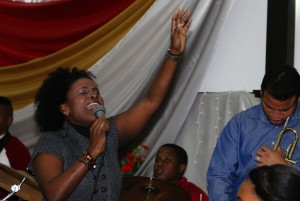
Worship leader Lauren Smith Perez singing at Central Methodist Church in Havana, Cuba. Photo by Steve Beard.
By Steve Beard-
Within a Caribbean culture marked by Cold War skullduggery, economic scarcity, and vindictive secularism, the Methodist Church in Cuba stands out as a beacon of spiritual freedom, miraculous signs and wonders, unexpected blessings, and salsa infused worship. Not only has vibrant Christianity survived some of the darkest decades of Cuba’s history, it is a thriving testimony to the profound hope found at the roots of the faith.
“Young people in Latin America have spent a long time learning a language that is different than the language of God,” said the Rev. Guillermo Leon Mighthy, illustrating the prevailing way of thinking in Cuba.
“By the age of 18, they have heard more than 80,000 times these five phrases: (1) ‘I don’t know,’ (2) ‘There isn’t any,’ (3) ‘I don’t have any,’ (4) ‘I can’t,’ and (5) ‘It’s not easy.’ Five negative phrases; nothing positive,” said Leon. “This is not the language of the Bible.”
Leon is the 41-year-old lead pastor of the Central Havana Methodist Church in one of the grittiest neighborhoods in the Cuban capital. As a former professional soccer player and past leader of Methodist youth in Cuba, Leon has a spiritual counterattack for each of these phrases.
“First, the Bible never says that we don’t know. We know who we are, we know what we have, and we know the One who is with us. Second, yes there is; in God there is hope. In God there is healing. In God there is blessing,” said Leon, who is also the district superintendent of Havana.
“Third, yes we have. God says he is our shepherd and we will lack nothing. God says that whatever we lack we will receive in riches in his glory,” he continues. “Fourth, yes, we can do it. The apostle Paul says in Philippians that we can do all things in Christ who strengthens us. Lastly, with Christ it is easy, because Christ helps us. Nothing is impossible with God.”
The falling of the fire
Hope and anticipation are common themes in Leon’s preaching, along with spiritual warfare, victory, overcoming, healing, and blessing. These are also the repeated themes in the Cuban Methodist pulpits and the narrative of testimonies delivered during services. The spiritual dynamic behind the growth of Cuban Methodism is the “movement of the Holy Spirit,” said Pastor Aylen Font Marrero, a 29-year-old staff member of the Methodist Cathedral of Holguín, 450 miles east of Havana.
According to the latest information provided by the Methodist Church of Cuba, there are 410 churches and 927 missions (churches in formation). With
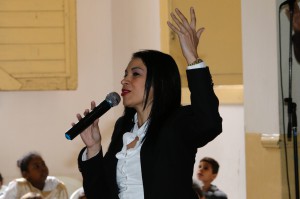
Pastor Adria Nuñez Ortiz delivering a message at Central Havana Methodist Church. Photo by Steve Beard.
approximately 46,500 members, there are about twice that number involved in the ministry of the denomination in different ways.
Although the personalities and styles of each congregation may differ, Font believes that Cuban Methodists are unified in “seeking God, the movement of the Holy Spirit, the falling of the fire and anticipating the glory of God to descend.” The primary focus of each congregation is “the love of God for the people of God. This is what we want to really see and experience and see grow,” she said.
The embers of this revival fire have been stoked since the 1970s, reports the Rev. Dr. Rini Hernandez, district superintendent in the Florida Annual Conference. Desperate times called for desperate measures. Methodists all over Cuba were participating in all night prayer vigils, reports Hernandez. The outgrowth of their prayers were miraculous signs and wonders, including speaking in tongues, physical healing, deliverance from spiritual oppression, and being physically overwhelmed by the power and presence of God in their meetings.
“We did not know it was Pentecostal,” Hernandez told Good News. “We were just asking God to fill us with the Holy Spirit.” Along with the outpouring of supernatural occurrences, these Methodists experienced a holy boldness that has characterized their singular focus on sharing their faith. “We lost all fear of repercussions and committed ourselves to share the good news of Jesus Christ with the Cuban people, one life at a time,” he recently wrote in an article for the Florida Annual Conference. “The Holy Spirit’s fire spread out to the local churches, youth camps, and almost every event in the life of the church.”
Heart-warming experience
In an interview with Bishop Ricardo Pereira in conjunction with my first visit to Cuba more than 16 years ago, he told of his special experience with the Holy Spirit on October 18, 1984, many years before he became bishop. “At that time I had two young men in my church —14 and 16 years old. They had read about John Wesley and his ‘heart-warming’ experience,” Pereira said.
“That night, at 8 o’clock they knelt down in the church and said to me, ‘Pastor we are not going to get up from here until we have the same experience that John Wesley had.’” Pereira told them that they were confused. “I don’t think it works that way. I have been told that not everyone receives the same experience.” Nevertheless, these boys were going to pursue a blessing from God. Pereira said that he grabbed one of the boys, but he said, “Pastor I will not get up from here.”
Pereira was angry. “I slammed the door and went home and started watching television,” he admits. “But something was stirring in my heart, telling me, ‘Pastor you are not doing right. How can you allow your members to pray by themselves? Why don’t you go and keep watch with them?’”
He walked back to the sanctuary and said to them, “See, you have not received anything.” The boys continued asking God to give them the power to evangelize. At 11 o’clock he told them, “It is very late. Why don’t you begin again tomorrow?”
“No pastor,” they said, “we are not going to get up from here until we receive the touch of the Spirit.” At 12:04, Pereira reports that the boys had an “explosion of light in their faces and great joy in their heart.” After their experience, Pereira said: “I was so afraid that I knelt next to them and said, ‘Okay, I won’t get up until He fills me up, too.’ I wept and asked God to forgive me. And I said, ‘Lord I want you, too. I have been preaching the gospel, doing the best I could, but if this joy is real, if you can give that explosion in the hearts of my two members, you can give it to me, too.’
“At 3:00 a.m. we were all like mad people, speaking in tongues. I woke up my wife so that I could tell her that I too had this joy in my heart.”
Renewed Methodism
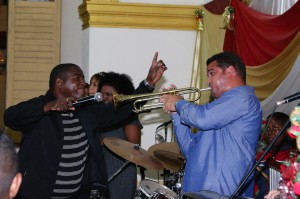
The Rev. Guillermo Leon Mighthy holds the microphone for trumpet player Jorge Lázaro Corrales Estradas. Photo by Steve Beard.
Although both share in an experiential and supernaturalist faith, Pentecostal denominations such as the Assemblies of God believe that speaking in tongues is the “initial evidence” of receiving the baptism of the Holy Spirit. That is not a doctrinal distinctive for Methodists. Nevertheless, Methodist services in Cuba are unapologetically charismatic. The framework for theology and ministry within Cuban Methodism was not imported from other denominations, but is an organic expression of their own unique divine encounter.
The Cuban experience mirrors the religious trend of its neighbors. In the latest study of 18 Latin American and Caribbean countries and one U.S. territory (Puerto Rico), Pew Research found that two-thirds of Protestants (65 percent) identified as Pentecostal Christians either through denominational affiliation or personal self-identity.
Sociologists pair Pentecostals and charismatics into the category of “renewalists” when studying international religious trends. As the fastest growing spiritual movement, renewalists account for one-fourth of all global Christians with upwards of 500 million adherents. According to the World Christian Database of the Center for the Study of Global Christianity, Brazil has the highest number of renewalists, followed by the United States, China, Nigeria, India, and the Philippines.
As Professor Philip Jenkins points out in his ground-breaking work, The Next Christendom: The Coming of Global Christianity, believers outside the United States take the Bible very seriously. “For Christians of the Southern Hemisphere, and not only for Pentecostals, the apostolic world as described in the New Testament is not just a historical account of the ancient Levant [sections of the Middle East], but an ever-present reality open to any modern believer, and that includes the whole culture of signs and wonders. Passages that seem mildly embarrassing for a Western audience read completely differently, and relevantly, in the new churches of Africa or Latin America.”
At the outset of the Cuban revolution, the late Fidel Castro used to define the boundaries of cultural engagement to the intellectuals and artists: “Inside the revolution, everything. Against the revolution, nothing.” Within revival, the Methodist Church has transfixed and transformed – redeemed, perhaps – that kind of singular focus to a pinpoint: Cuba for Christ.
High voltage worship
Even non-church going observers would recognize something combustible and dynamic taking place in a Cuban worship service. This is not the place to be if one has been lulled into expecting a predictable 55-minute morning service with two Victorian-era hymns, a children’s sermonette, a choral anthem, a homily, and tidy benediction.
“We worship God with so much passion,” said Pastor Adria Nuñez Ortiz, “we give him praise with all we have in our hearts. We have so much love for God because we understand that he has done so much for us. Everything we do for him is nothing in comparison to what he has done for us.” Nuñez is associate pastor of Central Havana Methodist Church and married to Pastor Leon. She is also a songwriter, musician, and leader of their high-energy choir.
The worship time is unmistakably Caribbean. “As in biblical times, Cuban Methodists praise the name of the Lord and dance with all kinds of instruments and shouts of joy,” Bishop Pereira told me not long ago. There is a jacked-up salsa beat with a sliver of hip-hop and drums, congas, guitars, bass, trumpets, and trombones. If you solely associate Cuban music with Buena Vista Social Club, there is a brand new galaxy of sound in the church. The worship is frenetic, physical, ecstatic, electrifying, and emotional.
With a smile, one pastor told me that the “jumping does not draw the Holy Spirit, but jumping is the response when the Holy Spirit falls.”
For Nuñez, the pogoing up and down in worship is a simple expression of joy. “We rejoice every time we think about what God has done for us,” she said. “Specifically in our context of central Havana, many people were drug addicts, idol worshippers, prostitutes and God took them out of that way and saved them. The Bible says that the one who is forgiven much, loves much. And when somebody pays a huge debt for you, then expressions of joy and happiness come out of your heart and that’s what’s happening in Cuba.”
New day in Cuba
Needless to say, many things have changed in Cuba since my first visit in 2000. Netflix is streaming (for those with credit cards); the online home rental business Airbnb is now available to foreigners, the black market emporiums are hiding in plain sight, and the Rolling Stones played last year before 500,000 in Havana in a free concert a few days after President Barack Obama’s controversial visit. With the average Cuban making less than $20 a month, there still isn’t expendable income for luxuries such as high-dollar rock concert tickets.
Cell phones are omnipresent (a vibrant black market), but the internet is spotty and frustratingly slow. Private enterprises are still in infancy stages, as one might expect in one of the last remaining Communist countries. There is, understandably, a strand of “forbidden island” allure for Americans to explore Cuba as more avenues open for tourism. Many visitors simply hit the Ernest Hemingway hot spots, buy cigars, rum, and a Che Guevara t-shirt, cruise around in a 1952 pink Cadillac convertible taxi cab, and then drink mojitos on the pristine beaches.
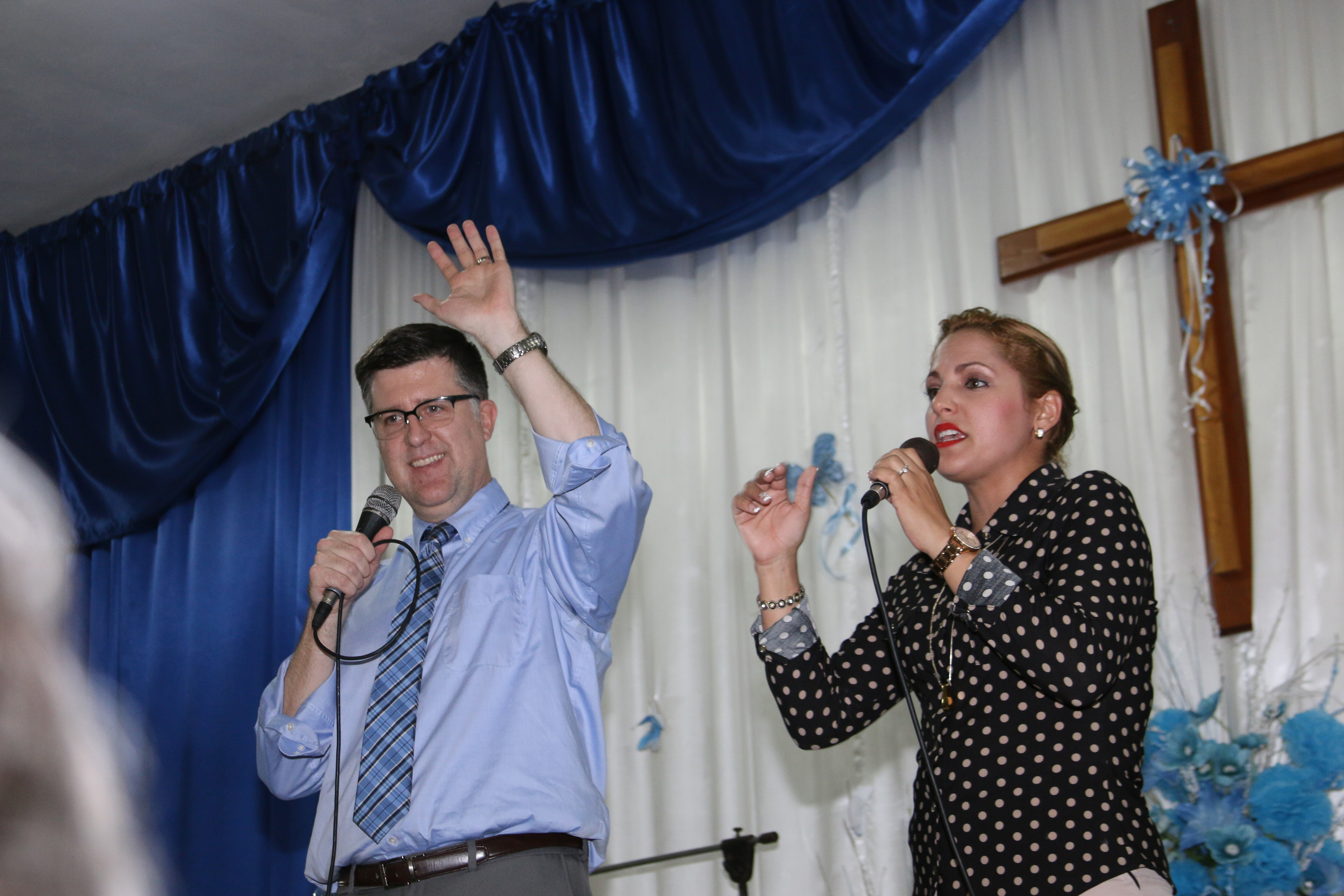
Dr. David Watson of United Theological Seminary preaches in Santiago de Las Vegas Methodist Church as Pastor Aylen Font Marrero translates the message. Photo by Steve Beard.
For Professor David Watson, however, the experience is all about plunging his students into the eye of a revivalistic tornado. “A lot of our seminary students have never experienced what spiritual renewal looks like, and when they come here they get to be a part of a very powerful Spirit-filled revival,” said Watson, the academic dean at United Theological Seminary. Watson has brought students to Cuba from the Dayton, Ohio, seminary for the last three years.
“One of the ideas behind our seminary’s emphasis on church renewal is that all renewal – individual, local church, or church universal – is the work of the Holy Spirit. That is certainly the case in the Cuban Methodist revival,” he observed. “We want our students to be exposed to and learn about what it looks like when God shows up in a powerful way in the life of a congregation or denomination.”
Amanda Moseng is one of those seminary students, soon-to-be a provisional elder in the West Ohio Annual Conference. Her trip to Cuba was sparked by a divine healing she experienced at a Holy Spirit conference hosted by United Seminary. While in Cuba, Moseng tirelessly prayed for healing and blessing for those who came forward at the end of each of the services. Not raised as a charismatic, the Cuban scenario was new, but she adapted with deftness and enthusiasm.
Moseng’s own healing encounter is the catalyst behind her faith to confidently pray for “healing in people and to open myself to let the Holy Spirit work in whatever way the Holy Spirit wants to manifest,” she said. Prior to her trip to Havana, she had never prayed for healing for someone else. She now has a “boldness of faith that only God grants, that only comes from the Spirit.” Moseng also had the unique opportunity to preach in the Central Havana church on “holy boldness” to an attentive congregation. “I’m just so humbled that God would choose me to do those things, that God would use me for that. I will be eternally grateful for what I’ve experienced here,” she said. “I’ve been transformed in ways I could never have imagined and I will leave here with a sense of boldness and faith that’s greater than I’ve ever had.”
Finding wealth in Cuba
For the last 28 years, the Rev. Jaime Nolla has made a yearly pilgrimage to Cuba. “When you see people who either walk for miles, travel on the back of a platform truck, or travel in an overloaded, very old bus, standing because of the lack of space, to get to a crowded church anticipating to experience the presence of God, your heart is moved in ways you cannot describe with words,” said Nolla, a retired United Methodist pastor and former district superintendent in the Wisconsin Annual Conference.
Nolla was one of the clergypersons standing in the front of the 500 men and women jammed into the sanctuary of the Vedado Methodist Church in downtown Havana waiting to be anointed with oil. The bustling and energetic congregation worships in a striking art deco church with loud praise music spilling out from the open doors and windows near the University of Havana. The expectancy and desire was palpable as those in seemingly never ending lines waited patiently in an attitude of prayer for this blessing.
Nolla’s numerous visits over such a lengthy period of time have afforded him opportunities to see innumerable Methodist congregations across the length of the island (more than 700 miles long).
“Many of these people come dressed with the one or two outfits they own because of the poverty on the island. However, none of the obstacles that would stop people from coming to church in the United States are big enough to stop them from coming to church,” he told Good News. “We are thankful to God for the commitment and dedication second to none that we have seen and experienced.”
“When you live in a place where there is extreme poverty, the response of the people is to find wealth in other ways,” observed the Rev. Rebekah Clapp, one of my travel mates and translators in Havana. “For Cubans, that spiritual wealth has become a response to that.” Clapp earned her M.Div. at United Theological Seminary after living in Nicaragua, and is currently working on her Ph.D. in intercultural studies at Asbury Theological Seminary.
“Because of the reality of spiritual forces that they interact with, Christians respond with language of victory, language of overcoming,” she continued. “They have victory in their lives in Christ over and against spiritual forces, over and against the powers of the idolatrous religions, over and against the work of the devil, and also over and against the socioeconomic and political reality in which they live. They can respond to it by saying, ‘I have life in Christ, I have power in the Holy Spirit, and I have victory.’ That gives them hope, that gives them purpose.”
It may also go a long way in explaining how the Methodist Church has been a sustained oasis in the spiritual desert of Cuba’s soul for the last 50 years.
Marking his 25th year, Steve Beard is the editor of Good News.


 As a poetic artist, Lecrae makes a distinction between a “Pastor Rapper” and that of a “lamenter” – a passionate expression of grief or sorrow that is an outgrowth of his youth and the abandonment he felt. When he was free from trying to preach like a “Pastor Rapper,” Lecrae felt the words and rhythms flow when he allowed himself to be vulnerable and honest about his own battles.
As a poetic artist, Lecrae makes a distinction between a “Pastor Rapper” and that of a “lamenter” – a passionate expression of grief or sorrow that is an outgrowth of his youth and the abandonment he felt. When he was free from trying to preach like a “Pastor Rapper,” Lecrae felt the words and rhythms flow when he allowed himself to be vulnerable and honest about his own battles. 
 “Anyone who knows my story would expect this book to ooze with justice issues. After all, the pain caused by injustice has motivated me to spend a lifetime working for social change on behalf of widows, prisoners, the poor, and anyone who struggles,” writes Perkins, the civil rights veteran who has led the Voice of Calvary Ministries in Jackson, Mississippi, since 1975. “So how did someone who has experienced the anguish of poverty, racism, and oppression end up wanting to write a book about love as his climactic message? Good question… I’ve come to understand that true justice is wrapped up in love. God loves justice and wants His people to seek justice (Psalms 11 and Micah 6:8). But I’ve come to understand that true justice is wrapped up in love. The old-time preacher and prophet A.W. Tozer had a way of making the most profound truths simple and palatable. He once said, ‘God is love, and just as God is love, God is justice.’ That’s it! God’s love and justice come together in the redemptive work of Jesus Christ, and we can’t be about one and not the other. They’re inextricably connected.”
“Anyone who knows my story would expect this book to ooze with justice issues. After all, the pain caused by injustice has motivated me to spend a lifetime working for social change on behalf of widows, prisoners, the poor, and anyone who struggles,” writes Perkins, the civil rights veteran who has led the Voice of Calvary Ministries in Jackson, Mississippi, since 1975. “So how did someone who has experienced the anguish of poverty, racism, and oppression end up wanting to write a book about love as his climactic message? Good question… I’ve come to understand that true justice is wrapped up in love. God loves justice and wants His people to seek justice (Psalms 11 and Micah 6:8). But I’ve come to understand that true justice is wrapped up in love. The old-time preacher and prophet A.W. Tozer had a way of making the most profound truths simple and palatable. He once said, ‘God is love, and just as God is love, God is justice.’ That’s it! God’s love and justice come together in the redemptive work of Jesus Christ, and we can’t be about one and not the other. They’re inextricably connected.”





 By B.J. Funk-
By B.J. Funk-



